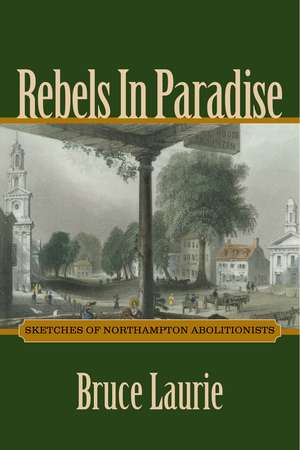Rebels in Paradise: Sketches of Northampton Abolitionists
Autor Bruce Laurieen Limba Engleză Paperback – 5 ian 2015
Long ago dubbed the "Paradise of America," Northampton, Massachusetts, is also known as the home of visionaries—from the Reverend Jonathan Edwards, father of the First Great Awakening, to George W. Benson, brother-in-law of William Lloyd Garrison and a founder of the utopian Northampton Association for Education and Industry. During the mid-nineteenth century the town became a center of political abolitionism and a hub in the Underground Railroad. In this book, Bruce Laurie profiles five rebellious figures who launched Northampton's abolitionist movement—Sylvester Judd Jr., John Payson Williston, David Ruggles, Henry Sherwood Gere, and Erastus Hopkins. Through their individual stories he traces the evolution of the antislavery movement in western Massachusetts and links it to broader developments in economics, civil life, and political affairs.
Northampton's abolitionists were a heterodox group, yet most were intrepid devotees of democracy and racial equality, idealists who enjoyed genuine friendships and political alliances with African Americans. Several even took the bold step of hiring African Americans in their businesses. They avoided the doctrinal rivalries that sometimes troubled the antislavery movement in other places, skillfully steering clear of the xenophobic nativism that infected Massachusetts politics in the mid–1850s and divided the Republican Party at large. Although a prohibitionist faction disrupted the Northampton abolitionist movement for a time, the leaders prevailed on the strength of their personal prestige and political experience, making the seat of Hampshire County what one of them called an abolitionist "stronghold."
Northampton's abolitionists were a heterodox group, yet most were intrepid devotees of democracy and racial equality, idealists who enjoyed genuine friendships and political alliances with African Americans. Several even took the bold step of hiring African Americans in their businesses. They avoided the doctrinal rivalries that sometimes troubled the antislavery movement in other places, skillfully steering clear of the xenophobic nativism that infected Massachusetts politics in the mid–1850s and divided the Republican Party at large. Although a prohibitionist faction disrupted the Northampton abolitionist movement for a time, the leaders prevailed on the strength of their personal prestige and political experience, making the seat of Hampshire County what one of them called an abolitionist "stronghold."
Preț: 177.05 lei
Preț vechi: 197.46 lei
-10% Nou
Puncte Express: 266
Preț estimativ în valută:
33.89€ • 36.82$ • 28.49£
33.89€ • 36.82$ • 28.49£
Carte indisponibilă temporar
Doresc să fiu notificat când acest titlu va fi disponibil:
Se trimite...
Preluare comenzi: 021 569.72.76
Specificații
ISBN-13: 9781625341181
ISBN-10: 1625341180
Pagini: 184
Ilustrații: 20 b&w photos
Dimensiuni: 152 x 229 x 15 mm
Greutate: 0.27 kg
Ediția:First Edition
Editura: University of Massachusetts Press
Colecția University of Massachusetts Press
ISBN-10: 1625341180
Pagini: 184
Ilustrații: 20 b&w photos
Dimensiuni: 152 x 229 x 15 mm
Greutate: 0.27 kg
Ediția:First Edition
Editura: University of Massachusetts Press
Colecția University of Massachusetts Press
Notă biografică
Bruce Laurie is professor of history emeritus at the University of Massachusetts Amherst and author of Beyond Garrison: Antislavery and Social Reform.
Recenzii
"A lively, lucid, and eminently readable study. Succinctly but in well-judged detail, Bruce Laurie tells the story of antebellum abolitionism through biographies of some of the movement's prominent local figures in Northampton, Massachusetts."—Christopher Clark, author of The Communitarian Moment: The Radical Challenge of the Northampton Association
"In writing of David Ruggles and four other local abolitionists--Sylvester Judd Jr. , John Payson Williston, Henry S. Gere, and Erastus Hopkins--Laurie also looks at the larger anti-slavery movement in western Massachusetts and draws links to national developments of the era, from the birth of the Free Soil party to temperance movements to the creation of the Underground Railroad, along which Northampton became an important stop."—Hampshire Daily Gazette
"Rebels in Paradise is a fine piece of scholarship for at least two reasons. First, the men profiled in the book left surprisingly few personal documents, meaning the Laurie had to construct their histories from a fairly scanty evidentiary record. Second, Laurie does not engage in interpretive overreach. He acknowledges that what he discovered about Northampton's abolitionists may not be universally applicable. Rather, he simply aimed to provide 'a deeper and richer understanding of the meaning of political abolitionism in a particular place and time.'"—New England Quarterly
"In writing of David Ruggles and four other local abolitionists--Sylvester Judd Jr. , John Payson Williston, Henry S. Gere, and Erastus Hopkins--Laurie also looks at the larger anti-slavery movement in western Massachusetts and draws links to national developments of the era, from the birth of the Free Soil party to temperance movements to the creation of the Underground Railroad, along which Northampton became an important stop."—Hampshire Daily Gazette
"Rebels in Paradise is a fine piece of scholarship for at least two reasons. First, the men profiled in the book left surprisingly few personal documents, meaning the Laurie had to construct their histories from a fairly scanty evidentiary record. Second, Laurie does not engage in interpretive overreach. He acknowledges that what he discovered about Northampton's abolitionists may not be universally applicable. Rather, he simply aimed to provide 'a deeper and richer understanding of the meaning of political abolitionism in a particular place and time.'"—New England Quarterly
